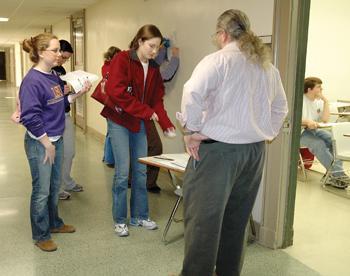Four letters. Three years. Your future. All crammed into four hours. Are you nervous yet? I was. The Law School Admissions Test has become a staple of the college experience for thousands of undergraduates and countless more college alumni who want to continue their professional careers in the prestigious field of law. Saturday I filed into Coates Hall with numerous other test-takers to take the LSAT. I ran over every awful scenario in my head and felt prepared for everything. I’m that guy who freaks out at every little sound during a big test. Quite literally, I get distracted by everything. Already nervous, I let every little thing get to me. The proctors put me next to the door, which I knew would keep me distracted. I was that much closer to every sound slithering through the crack between the door and the floor. A girl walked in who did nothing but cough from the moment she hit the seat. I had a nagging itch on my right ear that just wouldn’t go away. I finally started the test and blew the first section out of the water. Having taken several practice tests, I can gauge my performance relatively well. I finished the section with roughly six minutes left – something I had never done. I knew I was on my way to that magical number – 170. Hello, Harvard. Hello, Yale. And then goodbye, Harvard. Goodbye, Yale. The evil folks at the Law School Admissions Council, the writers and administrators of the test, strategically place in the test what is called an “experimental” section. This section does not count towards your final score and falls under one of the three section types on the test – logic games, arguments or reading comprehension. The experimental section usually is among the first three sections on the test out of a total of five sections. As it turns out, on my test the first section was an experimental games section. I had destroyed an unscored section. Of course, when the real games section came around in the fourth section, I did not blow it away. In fact, I just blew it. I have no doubt this affected my performance on the last section of the test. My performance would not upset me were it not for the weight law schools give the LSAT in the admissions process. This is not just the ACT or the SAT. According to test preparation company Princeton Review, “In virtually every case, the LSAT is given more weight than undergraduate GPA.” If the horror stories are true, an easy grasp of the material, which the LSAT supposedly tests, will not be the most indicative factor in determining one’s success in law school. Rather, a good work ethic coupled with an adequate grasp of the material covered will determine which students will excel. Indeed many law schools, according to the Princeton Review, use an admissions index in which they combine the applicant’s GPA and a weighted LSAT score into one number. Unfortunately, this process perpetuates the dependence on such concrete numbers in determining the status of all law school applicants. Professor Jeffrey Stake of the Indiana University School of Law, in a Feb. 4, 2003 article for JURIST, a Web-based legal research site run by the University of Pittsburgh School of Law, said, “This increasing attention to the index necessarily comes at the expense of more subjective criteria such as honesty, integrity, gumption, creativity and other aspects of fitness to practice as a lawyer.” Stake also discusses how law schools allow their rankings in the U.S. News annual report to affect the admissions process. “Because this index incorporates the same two criteria used by U.S. News, accepting the applicants with the highest indexes will improve a school’s ranking,” argues Stake. Stake proposes that schools publish only the highest scores of the students currently enrolled, arguing this would ensure the law schools would only need to admit “about 35 percent to 40 percent of the class by index alone.” While this proposal would allow schools to look at other important measures, it falls short of addressing the true problem. The LSAT itself is geared toward testing logical capabilities of aspiring law school students. The importance law schools place on the LSAT indicates that the schools emphasize the potential of the students to easily grasp the material. A student may be able to grasp key concepts easily, but he or she may not have the work ethic to excel as an attorney, a rigorous and competitive profession. The question remains – can a student with a 172 on the LSAT and a 3.5 undergraduate GPA perform as well in law school as the student with a 165 and a 4.0? Such arbitrary numbers can never indicate the true breadth of a student’s abilities. Law schools should judge students on a case-by-case basis, but that process could become too cumbersome. What, then, is the solution? I’m still not sure, but I can only hope the top schools don’t overlook my application based on numbers alone, opening it to find an incredible resume of countless activities and abilities. On second thought, I ought to retake the test.
—–Contact Jack Collens at jcollens@lsureveille.com
Taking the LSAT reveals its problems
February 14, 2007

Regina Depree, a history senior, shows her identification and signs her name before entering the Coates Hall classroom to take the LSAT as Daily Reveille columnist Jack Collens waits inside.



